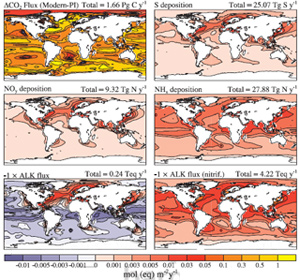Industrial pollution worsens ocean acidification, threatens marine animals
Industrial pollution acidifies ocean, threatens marine animals
mongabay.com
September 3, 2007
Ocean acidification, already a concern due to rising levels of carbon dioxide, is worsening due to nitric acid and sulfuric acid from industry, report researchers writing in this week’s issue of the journal Proceedings of the National Academy of Science (PNAS).
Using atmospheric and oceanic computer models, scientists led by Scott C. Doney of the Woods Hole Oceanographic Institution found that fossil-fuel combustion and agriculture result in atmospheric deposition of reactive sulfur and nitrogen in coastal waters of North America, Europe, and South and East Asia.
“Atmospheric inputs of dissociation products of strong acids [Nitric acid (HNO3) and sulfuric acid (H2SO4)] and bases [ammonia (NH3)] alter surface seawater alkalinity, pH, and inorganic carbon storage,” the authors write. “The direct acid/base flux to the ocean is predominately acidic (reducing total alkalinity) in the temperate Northern Hemisphere and alkaline in the tropics because of ammonia inputs. However, because most of the excess ammonia is nitrified to nitrate (NO3) in the upper ocean, the effective net atmospheric input is acidic almost everywhere.”
 Model estimated anthropogenic (1990-2000 – preindustrial) atmospheric deposition fluxes for carbon, nitrogen, and sulfur); alkalinity; and potential alkalinity, assuming complete nitrification of NH4 and NH31). |
Doney and colleagues say that while the influence of atmospheric carbon dioxide on ocean chemistry is greater than the effects from anthropogenic nitrogen and sulfur deposition, “the impacts are more substantial in coastal waters, where the ecosystem responses to ocean acidification could have the most severe implications for mankind.”
Ocean acidification is significant for sea life because it strips carbonate ions from seawater, making it more difficult for corals and marine microorganisms to build the calcium carbonate skeletons that serve as their structural basis. Research has shown that many marine species fare quite poorly under the increasingly acidic conditions forecast by some models. In the past, rapid ocean acidification has been linked to some of Earth’s most severe mass extinction events.
Scott C. Doney et al (2007). Impact of anthropogenic atmospheric nitrogen and sulfur deposition on ocean acidification and the inorganic carbon system. PNAS Early Edition September 3, 2007. www.pnas.org doi 10.1073 pnas.0702218104














